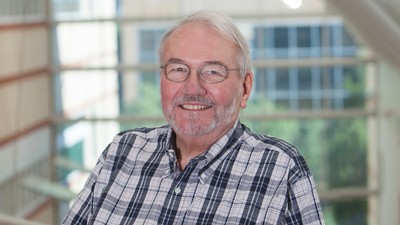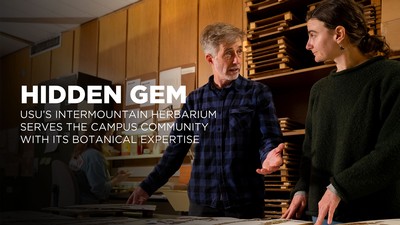For the second year in a row, Utah State University’s rocket team has won the grand prize of NASA’s 2008-2009 University Student Launch Initiative. As top winner, the USU team will receive $5,000 from ATK and an invitation from NASA to attend a space shuttle launch at NASA’s Kennedy Space Center in Florida in fall 2009.
USU students beat out 18 other American college and university teams that participated in the challenge, including Arizona State University, Georgia Institute of Technology, Vanderbilt University, Florida Institute of Technology and Alabama A&M University.
“It has been the most difficult yet rewarding project we as engineers have worked on, and we wouldn’t have given it up for anything,” said team member Nick McKee. “The team really feels that not only did we build a rocket, but we built the skills each of us will use for the rest of our lives as mechanical and aerospace engineers.”
The launch contest challenges student teams to design, build and fly reusable rockets with scientific payloads one mile high and return them safely to Earth. NASA’s competition judges then evaluate each team’s rocket design, flight data and final written report about payload results and overall experience.
“The competition was a great experience,” said team member Amy Jo Bowdidge. “It allowed us to use all the information that we’ve gained from the past years of school and apply it to something physical. The entire team worked very hard and put in long hours.”
The team sacrificed free time and worked extra hours, including over the Christmas holidays and spring break, to prepare for the competition.
Team member Heather Williams said first-place award is a great honor for the entire team, but as important and rewarding as the actual award is, it could never adequately reflect the learning experience and the bonding experience the team went through.
“When working with people on a project that takes all your life, there is no award that could ever reflect the true depths of that effort,” she said.
The annual competition is designed to engage and inspire technically gifted young people to pursue careers in fields devoted to science, technology, engineering and mathematics. The Marshall Center’s Academic Affairs Office organized the event, which is sponsored by ATK Space Systems of Magna, Utah.
“It was amazing to see the level of talent that participated in the competition,” said Jim Halsell, ATK Space Systems vice president, Space Exploration Systems and former NASA astronaut. “If these students pursue careers in engineering and science, America will have a tremendous future in space exploration as we return to the Moon and journey out into the far reaches of the solar system.”
Stephen A. Whitmore, faculty mentor for USU’s senior design team, praised this year’s team and also took time to look back on the efforts of last year’s award-winning first-place team. “One of the keys to this year's success is that last year's team left a well-documented legacy for this year's team to build on. And this year's team, to their credit, took advantage of that legacy.”
Whitmore is an assistant professor in the Department of Mechanical and Aerospace Engineering who came to USU in fall 2005 after retiring from NASA. He worked for NASA for more than 25 years.
“These wins give the USU engineering program tremendous exposure on a national stage,” Whitmore said. “At the competition, and afterwards at the awards ceremony, there wasn’t a person involved who mixed up who the rocket experts in Utah are — Utah State University — and they all put that ‘State’ part in the name!”
He said NASA did an excellent job running the competition — “40 teams of students with high explosives, and not a single incident or safety concern ever occurred."
The competition itself is extremely demanding, Whitmore said. The students build a rocket with a guidance system that is on the order of complexity of that of an ICBM missile. The rocket fires off, disappears into the sky, and 20 seconds later, as just a visible speck, it turns the corner and hits within 22 inches of the targeted one-mile altitude.
“That’s like throwing a basketball from Old Main to the Spectrum and hitting nothing but net!" Whitmore said.
USU’s team had received honors in April at the post-launch banquet for “Best Vehicle Design,” for the most creative and innovative overall vehicle design while still maximizing safety and efficiency; and the “Project Review Award” (also called the Best Overall Documentation and Presentation Award), for the best combination of written design and flight readiness reviews and formal presentations.
In the overall competition, University of Alabama in Huntsville placed second, and Florida Institute of Technology in Melbourne was third. Florida Institute of Technology, which fielded a rocket team for the first time this year, was also named the "Rookie Team of the Year."
McKee said it is important that the team give public thanks to all the sponsors that supported the team financially and with other help, including the College of Engineering, ATK, Space Dynamics Lab, the Mechanical and Aerospace Engineering department, Rocky Mountain Space Grant, Utah Chapter of the American Institute of Aeronautics and Astronauts and ASUSU.
The USU team members are: AmyJo Bowdidge, Corrdell Wright, Stanford Rosen, Marc Loertscher, Shaun Copeland, Aaron Shields, Alex Wouden , Bryce Nash, Heather Williams, Jed Butler, Jessica Anderson, Justin Christensen, Justin Teuscher, Kyle Jeppson, Luke Hanks, Matthew Wilson, Michael Tolman, Paul Lyon , Nickolus McKee, Yutaka Fujiwara, Zach Peterson, Peter Santerre, Jacob Brown, Mike Phillips, Shane Robinson, Nate Lodder, Bowen Masco. The USU team is led by USU graduate student Shannon Eilers and faculty advisor Stephen Whitmore.
Related links:







